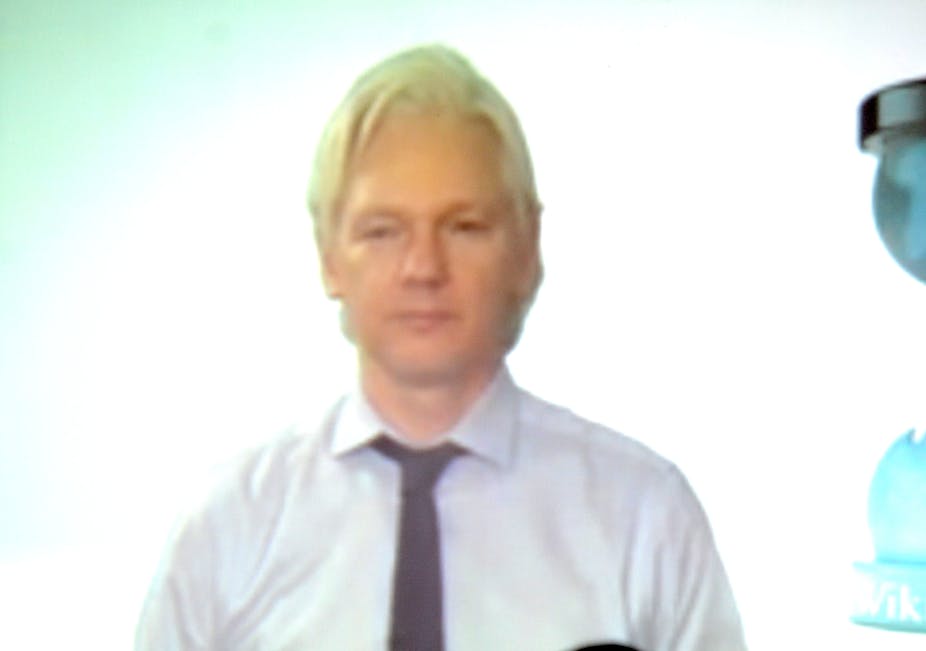Contrary to twittering by the digerati, the Victorian Supreme Court suppression order revealed by WikiLeaks this week isn’t unprecedented. It isn’t futile, dangerous or an egregious restriction on a supposedly comprehensive right of free speech.
It is instead something that we should respect as a manifestation of justice in a liberal democratic state, where charismatic individuals do not get to take the law into their own hands.
WikiLeaks has revealed that the Supreme Court made a suppression order regarding prosecution of alleged criminal offences. Those offences may or may not involve some high-profile overseas figures.
The Australians who are on trial remain innocent until proven guilty. So do any people overseas.
From a justice perspective any claims in cyberspace have no value. We do not engage in trial by journalists, Twitter or WikiLeaks.
Suppression orders are part of justice
Suppression orders restrict reporting of some or all information that appears in a trial. Such orders are traditional. They don’t mean that the court is closed or “secret”.
Courts typically use suppression orders to protect the victims of serious offences or to underpin the administration of justice – for example, legitimate action by law enforcement and national security personnel. Orders made by a court can be challenged, amended (for example, shortened) or removed altogether. The order published by WikiLeaks needs to be read carefully and in context, rather than through the lens of Julian Assange.
Astute readers can often infer the content of an order, particularly with the assistance of the mass media. Some courts are responding by granting so-called super-suppression orders, which restrict reporting the existence of an initial order. Super-suppression is problematic but can be seen as a response to irresponsibility on the part of some media organisations.
In making sense of the Victorian order two things are significant. Disregard of an order is contempt of court, punishable as an attack on the overall justice system.

Journalists and activists have no authority to ignore an order. That was demonstrated in the prosecution of shock jock Derryn Hinch, whose reporting breached an order prohibiting the identification of a sex offender. Having a microphone or a keyboard doesn’t place you above the law.
Orders are often misunderstood or misrepresented, particularly by media interests that consider the protection of privacy or respect for justice gets in the way of a headline. Authoritative studies in the UK (for example, the Neuberger report) and Australia debunk myths about a supposed flood of frivolous, long-lasting or otherwise inappropriate orders.
There is variation between jurisdictions but courts, for example Victoria’s Supreme Court in litigation involving one of Australia’s richest men and the NSW Supreme Court regarding our richest woman, are acting responsibly. They are not casually handing legal lollipops to importunate children.
What are the consequences of this contempt?
What are the consequences for Assange? In practice, very little. He remains on Ecuadorean soil in the form of Ecuador’s embassy in London. It’s unlikely that he’ll be prosecuted for contempt of court and even if he did face legal action he’d presumably welcome the notoriety.
The consequences for the justice system in Australia are more interesting. The granting of orders by courts in Victoria in connection with the Underbelly TV series sought to ensure fair trials. The effectiveness of those orders was undermined by ordinary Australians who blogged, emailed, ripped and burned or SMSed.
The new media that Assange has exploited in his latest grab for publicity do not respect the borders of liberal democratic states. My research argues that people who subverted the Underbelly orders often did so in emulation of peers, as an assertion of agency (important for tech-savvy 16-year-olds) or because they believe that law has no value in cyberspace.
Narcissism aside, Assange’s motivation presumably reflects his interest in subverting the state in favour of an anarchist utopia.
By now, many readers of The Conversation and other Australians have visited the WikiLeaks site and drawn conclusions about what’s being alleged in the Victorian court. The conclusions and allegations may be incorrect.
From the perspective of justice we face questions about open courts and the effectiveness of orders that are flouted by people located offshore but writing for Australian audiences.
More subtly, we face questions about information literacy. In the age of Wikileaks and Edward Snowden, misinformation can go round the world in a second. Not everyone will understand what they read or critique claims that are false. It is interesting that readers apparently assume that governments always lie and Snowden and Assange always tell the truth.
If we want to reconstruct the state, let’s do that through parliamentary processes and a respect for the justice system rather than on the basis of an expose by someone who’s a guest of Vladimir Putin or hiding in an Ecuadorean broom cupboard.
This article was amended after publication to correct references to the Hinch prosecution and the Underbelly suppression orders.

